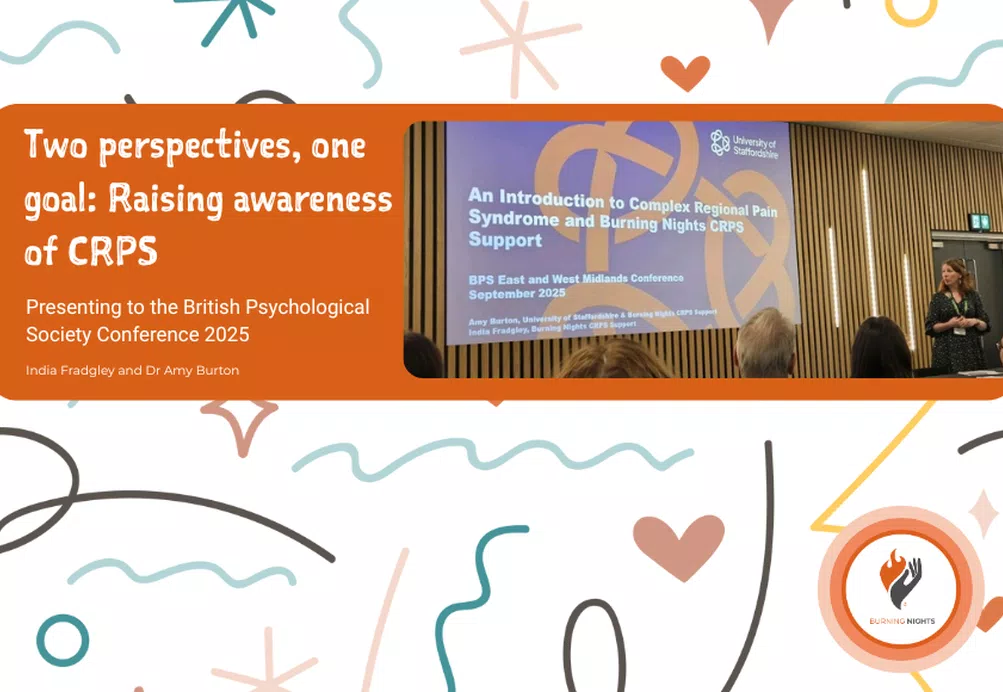We use cookies to improve your experience. By accepting you agree to our cookie policy


Complex Regional Pain Syndrome (CRPS) is often described as one of the most painful conditions known to medicine. Yet it remains poorly understood, even among healthcare professionals. By combining the lived experience of a Burning Nights CRPS Support volunteer (India Fradgley) with the insights of an academic researcher, therapist and volunteer (Dr Amy Burton), our presentation offered two perspectives on the same condition. Together, we highlighted not only the science behind CRPS, but also the human story that brings the research to life.
The September 2025 British Psychological Society (BPS) West and East Midlands Branch Annual Conference, in Birmingham UK, academics, practitioners, trainees and students from across the Midlands region gathered to share our work with a friendly audience.
We reflect on how this collaboration came about, what we shared with the audience and why partnerships like ours matter for the future of psychology.
Our presentation focused on an introduction to CRPS and Burning Nights CRPS Support charity, for psychologists and other mental health professionals.
Amy outlined what CRPS is, the symptoms, treatments and the research relating to mental health outcomes (such as depression or anxiety) following a CRPS diagnosis. The second half of the presentation included a video created by India, that focused on sharing the patient perspective of CRPS and what those living with the condition would want psychologists to know.
We felt this was an important topic to bring to the BPS Conference this year, since so many health professionals still have such limited knowledge of CRPS.
The audience was all new to CRPS, expressing surprise and frustration regarding patient experiences. Questions related to the length of time for diagnosis of CRPS, people with CRPS’ perceptions and experiences of working with psychologists and how CRPS compares to other rare conditions causing symptoms such as pain and fatigue.
CRPS involves complex interactions between pain perception, the nervous system and mental wellbeing. Raising awareness among psychologists encourages a more integrated, biopsychosocial (physical, mental and socioeconomic) approach to care.
We first came together as a team in early April 2025. Amy had not long started with Burning Nights CRPS Support as a volunteer therapist, when she spotted that the BPS 2025 Festival of the Midlands was taking place.
“It struck me that as a Midlands-based psychologist I previously had very little exposure to learning about CRPS and my peers across the Midlands were probably the same,” Amy said. “This seemed like the perfect opportunity for awareness raising. However, living with CRPS is not my story to tell.”
Amy reached out to the Burning Nights CRPS Support volunteer community for anyone interested in helping with the conference talk. India stepped up and contributed detailed knowledge about CRPS including the symptoms and treatments, an overview of the literature on the psychological impacts and not least, shared her own lived experiences and opinions on what psychologists need to know. Amy delivered that information in person, but she was keen for India to be ‘present’ too.
We decided that India would pre-record a video for the presentation, within which her message was strong and clear. Care needs to be joined up and to recognise those with CRPS as a whole person rather than a series of symptoms. Professionals must connect with the patient and with each other to provide holistic care that ensures those with CRPS are heard and responded to with understanding and compassion.
India said: “I was happy to collaborate with Amy – it gave me the chance to not only voice my lived experience but to also share the story of someone else with CRPS who I interviewed for an article I wrote earlier this year. It also allowed me to make suggestions about multidisciplinary practice for patient care and to share some of the science behind CRPS, which I illustrated by creating a simple infographic.”
Amy explains that the work she does as a psychologist is driven by the motto of disability activism movement’s: ‘Nothing about us without us’.
“I strongly believe that decisions, policies and practices should all start with the needs of the community for whom they are being developed,” she said. “The first stage is to listen, whether to the individual within a one-to-one therapeutic situation or research interview, or to the community through collaboration and discussion as part of consultation or research.
“I’ve often noticed that conferences lack the presence and voices of people with lived experience and I am keen for that to change too,” says Amy.
The value of combining lived experience and volunteer work with academic research shouldn’t be underestimated – it adds much value by providing unique, real-world insights to help research reflect community needs.
Our presentation showed that CRPS is best understood when science and lived experience speak together. We invite our colleagues across the psychology sector to create space for volunteer and service-user voices.
Burning Nights CRPS Support, led by founder Victoria Abbott-Fleming MBE, has created an active community and a learning hub for those with CRPS. Do get in touch to connect with our CRPS community.
If you’re interested in how patients and the public can shape research and healthcare, take a look at the NICE People & Communities pages and their Patient & Public Involvement policy. You can also explore the HRA’s public involvement resources and the NIHR PPI standards. These are great starting points if you’d like to learn more, get involved, or bring co-production into your own work.
We use cookies to improve your experience. By accepting you agree to our cookie policy
 £
£